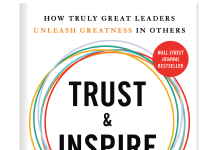
The power of mentorship when it comes to nurturing and developing leadership talent is widely recognized. Richard Branson, the founder of Virgin Group, credits his mentor, aviator and entrepreneur Sir Freddie Laker, with providing invaluable advice and support that helped him successfully launch Virgin Atlantic. According to Gallup, “Employees with either a mentor or sponsor are more than twice as likely as those without to strongly agree that their organization provides a clear plan for their career development.” Despite this, just 37 percent of professionals reported having a mentor in the workplace in 2024.
This is largely due to the practical concerns that are part and parcel of nurturing emerging leadership talent: Who is going to do the mentoring and development? How will the organization fund the initiative? The result of this is that many businesses don’t give mentoring or coaching the attention it needs, meaning that leadership programs lack the clear process, methodology, and tools for successful implementation.
The upshot of this, of course, is that many businesses don’t get the leaders they need. Indeed, there’s something of a leadership crisis: A recent study by DDI revealed that only 40 percent of leaders believe their company has high-quality leadership, marking a 17 percent decline from two years ago and the largest drop in a decade. This highlights the growing global leadership shortage—and points to an urgent need for effective leadership development and succession planning. A good leadership program isn’t nice to have—it’s essential.
How Fractional Leadership Can Help
This is where fractional leadership can help. In this innovative approach, which is gaining traction globally, fractional executives are highly experienced professionals, often from the C-suite, who offer their extensive knowledge and expertise across various disciplines such as finance, marketing, HR, technology, etc., on a part-time basis to those organizations that need it. These seasoned veterans have all “been there, seen it, and done it” in the corporate world but have decided to transition to a portfolio career, usually in search of a better work-life balance, and instead offer their services to a range of clients on a flexible, part-time basis.
This enables clients to have the experience of seasoned executives at their disposal, without the huge capital investment (and risk) involved in engaging a full-time C-suite. Those in fractional Chief Financial Officers (CFOs), Chief Marketing Officers (CMOs), Chief Human Resource Officers (CHROs), and similar roles are passionate about sharing their knowledge and making a meaningful impact. They have chosen to work in this new way, and as such, they are highly committed. They want to “give back” and have a wealth of experience, enabling them to work flexibly with businesses of all sizes and budgets. From a training perspective, they can guide, coach, mentor, and even deliver for you on specific issues without requiring significant training and oversight, bringing the following advantages:
1. Flexibility and Affordability
One of the most appealing aspects of utilizing fractional leaders for mentoring emerging talent is their flexibility and cost-effectiveness. Their services can be customized to fit within tight budgets and adjusted as needed over time to match the evolving demands of the organization. Importantly, leveraging fractional leaders for talent development alleviates some of the pressure on current staff, who can participate if they wish but without the overwhelm that comes from trying to fit the additional task of organizing training onto an already overflowing to-do list.
2. Experience and Insight
Fractional leaders bring a wealth of experience from having navigated the growth trajectories of larger organizations on multiple occasions. They are ideal mentors, as they have first-hand knowledge of the challenges and opportunities that lie ahead. This is of huge benefit to emerging talent, helping them get it right from the start. Additionally, fractional leaders serve as valuable sounding boards for current leaders, aiding in the smooth transition of leadership roles.
3. Gap Filling and Training
For entrepreneurial businesses that have yet to build a full senior team, fractional leaders can fill critical C-suite roles in a cost-effective manner. For instance, a fractional CFO can manage the finance function of a growing business while simultaneously providing on-the-job training and mentoring to the existing finance team and assisting in the recruitment of future talent.
4. Non-Threatening Support
Having chosen a portfolio career, fractional leaders are not looking for full-time employment within a single organization. It’s a lifestyle choice to which they are fully committed. This non-competitive stance ensures they are fully committed to supporting their mentees and current leaders without any ulterior motives. Their primary goal is simply to help individuals reach their full potential.
5. Oversight and Guidance
As emerging talent develops, fractional leaders offer essential oversight and guidance. They provide a reassuring presence and act as a safety net, identifying and addressing significant risks to ensure organizational stability during leadership transitions.
6. Succession Planning
Fractional leaders can oversee and manage the entire succession planning process within an organization. This takes the pressure off existing leadership, for whom succession planning can be an emotive and fragile thing to navigate. The fractional executive’s objective perspective, combined with external knowledge and best practices, is often what’s needed to ensure that succession planning receives the necessary focus and attention, with minimum fuss and upset.
7. Mutual Learning
Fractional leadership also fosters mutual learning and the exchange of ideas. Mentoring can be a two-way street, where individuals of all ages learn from each other. Age-diverse teams bring together complementary skills, knowledge, and networks, leading to better decision-making, more productive collaboration, and improved overall performance.
Given all the benefits, organizations need to find a way to build mentoring into the fabric of business as usual, and embracing fractional leadership could well be the answer—providing a sustainable solution for developing future leaders.




